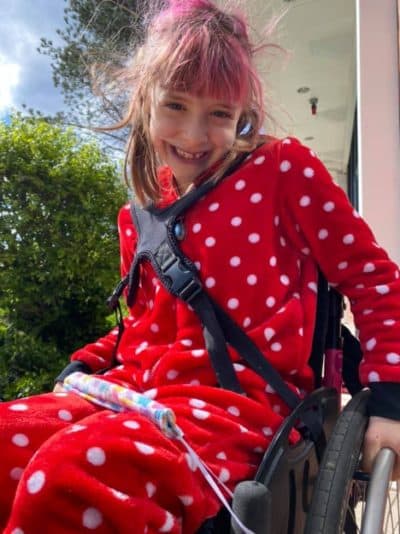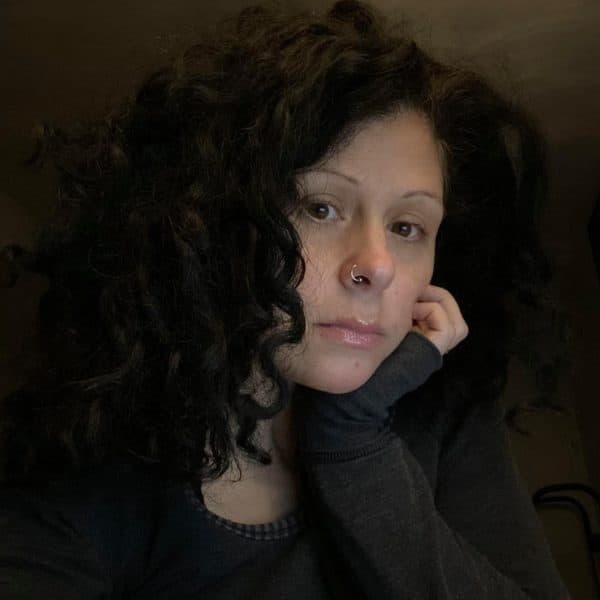Advertisement
Commentary
My Disabled Daughter Showed Me That None Of Us Are Independent

"Just try again, sweetie! You can do it. You need to learn to be more independent!" I heard from the backseat of my Subaru last year.
I was taking my disabled, almost 8-year-old daughter Freyja to a routine neurologist appointment and we were stuck in traffic. I turned the volume down on NPR to listen more closely. Freyja was having one doll teach the other about independence. "Come on, honey," she said again. "You have to practice so you can learn to do it by yourself!"
I didn’t have to think too hard about where she'd heard this. Freyja experiences it all day long, coming at her from every able-bodied person she interacts with. She has a rare neurological disorder that results in multiple disabilities, and her balance and motor skills are poor. She uses either a walker or a wheelchair to get around. A paraprofessional accompanies her through her school day, assisting with mobility, safety and activities of daily living.

"No, I don’t want help! Stop! I can do this by myself!"
Independence has long been painted as Freyja’s ultimate goal at school and in life, and for years, I pushed it as well. But after that moment in the car a year ago, I started thinking about what independence means for her — or anyone — and I have since had to acknowledge that my earlier perspective was ableist and wrong. I had it all backward.
It’s still hard for me to ask for help or admit that I can’t do things alone, but I do it more and more because letting people in and having a village of support not only makes life easier, it makes it more enjoyable. I have achieved interdependence. I don’t ask my parents for money. I don’t rely on others to do the things I can reasonably do for myself. But I grew up in the city, so I hire a landscaper to plant trees and prep my suburban lawn for summer. And I am not handy: I make my husband hang pictures and assemble shelves. We call a contractor for bigger projects. I take medicine when I am sick. Am I not an independent person because I do all of these things and more? These are the ways I get help through my days.
Advertisement
For Freyja, independence already looks like interdependence. She’s 9 now and she still needs help with many things, and she may always. I worry that she may never be able to live alone. My ableist mindset used to tell me this was the worst possible outcome, but a disabled adult friend of mine schooled me. Your house is a mess? You get a cleaner, she said. You live in Concord and need to get to Boston? You could walk or bike 17 miles along highways and city streets because your legs work. But is it realistic when you could just drive?
Now I know she will write her own story because she already tells me so.
Disabled people know we need assistance, my friend said. And we are okay with asking for it. We may need someone to come a few hours a day to help with bathing, shopping, cooking, whatever. We may need more than that. We may need less. But that doesn’t mean we have no autonomy, no independence.
Interdependence gives us independence, my friend told me. Freyja will know what she needs. You’ll know, too. Together you’ll know what to ask for and you’ll figure out what independence means for her. Trust her, and trust yourself.
This conversation has stuck with me. I had assumptions to check. I worried that my daughter couldn't live a rich and full life using a wheelchair. What if she needed help in the bathroom even as an adult? To me, that would be an invasion of privacy. To her, that would be assistance with a basic need. I worried and worried and worried. Now I know she will write her own story because she already tells me so. Even now she is very clear about how she wants to be helped, what she can do on her own, when she wants privacy, what she wants us to do and say for her, how she wants to be touched and more. If that’s not self-advocacy, I don’t know what is.
And ability is not absolute. When she is tired, she wants us to do more for her than when she is rested and feeling energetic. I have learned to trust her when she asks for help even with things I know she can do on her own. Maybe she is tired. Maybe she’s having a bad day. Don’t I have days when I just want my husband to make me a cup of coffee -- something I’m perfectly capable of doing for myself -- and bring it to me so I don’t have to get up off the couch? It’s nice to be cared for.
Now I listen to what my daughter says she needs instead of what I think she needs because I know it feels good to have people you love help you when you’re tired or achy or hurting. That doesn’t make her any less independent. It just makes her human.
